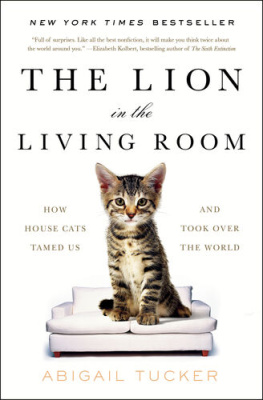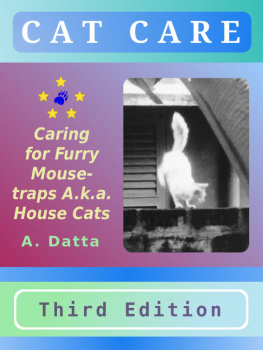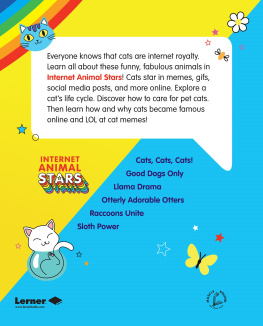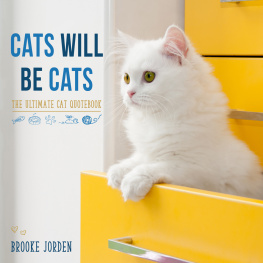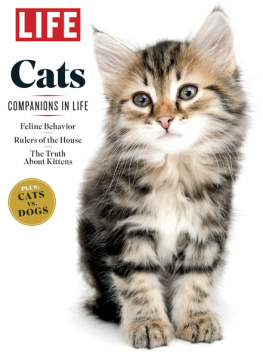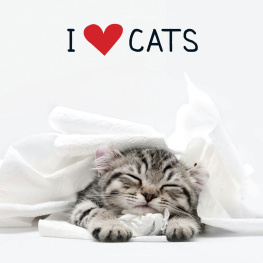
Simon & Schuster
1230 Avenue of the Americas
New York, NY 10020
www.SimonandSchuster.com
Copyright 2016 by Abigail Tucker
All rights reserved, including the right to reproduce this book or portions thereof in any form whatsoever. For information, address Simon & Schuster Subsidiary Rights Department, 1230 Avenue of the Americas, New York, NY 10020.
First Simon & Schuster hardcover edition October 2016
SIMON & SCHUSTER and colophon are registered trademarks of Simon & Schuster, Inc.
For information about special discounts for bulk purchases, please contact Simon & Schuster Special Sales at 1-866-506-1949 or .
The Simon & Schuster Speakers Bureau can bring authors to your live event.
For more information or to book an event, contact the Simon & Schuster Speakers Bureau at 1-866-248-3049 or visit our website at www.simonspeakers.com.
Book design by Ellen R. Sasahara
Jacket design by Gregg Kulick
Couch: Steve Gordon/Dorling Kindersley Collection/Getty
Kitten: Alex Telfer/Gallery Stock
Library of Congress Cataloging-in-Publication Data
Names: Tucker, Abigail.
Title: The lion in the living room : how house cats tamed us and took over the world / Abigail Tucker. Description: New York : Simon & Schuster, 2016. | Includes bibliographical references and index. Identifiers: LCCN 2016000722 (print) | LCCN 2016033028 (ebook) | ISBN 9781476738239 (hardcover : alk. paper) | ISBN 9781476738253 (Ebook) Subjects: LCSH: CatsHistory. | Human-animal relationships. Classification: LCC SF442.6 .T83 2016 (print) | LCC SF442.6 (ebook) | DDC 636.8dc23 LC record available at https://lccn.loc.gov/2016000722
ISBN 978-1-4767-3823-9
ISBN 978-1-4767-3825-3 (ebook)
For Mom
Oh, you cant help that, said the Cat: were all mad here.
Alices Adventures in Wonderland (1865)
CONTENTS
Introduction
I N THE summer of 2012, Denise Martin and her husband, Bob, were camping in the Essex countryside, about fifty miles east of London and not far from the quaint vacation town of Clacton-on-Sea. Evening was just settling on the campground when Denise glimpsed something unexpected through their bonfire smoke. The 52-year-old factory worker fished out her binoculars for a better look.
What do you make of that? she asked her husband. He, too, peered at the tawny creature lolling in a field a few hundred yards away.
Thats a lion, Bob said.
For a time they watched the beast and it seemed to watch them back. Its ears twitched, and it started cleaning itself. Later it ambled down a hedgerow. The couples reaction was serene, even philosophical. (You dont often see something like that in the wild, Denise later told the Daily Mail .)
Others at the campsite took a less tranquil view.
Christ, thats a lion, a neighbor said to himself as he peered through Denises binoculars.
Its a fucking lion! another man reportedly screamed, and took off running for his camper.
The catrumored to be as big as two sheepsoon disappeared into the night, and panic spread. Police sharpshooters converged on the country field. Zookeepers came armed with tranquilizer guns. Helicopters hovered ahead, deploying heat-seeking technology. The campground was evacuated and the press arrived to chronicle the big game hunt. British Twitter exploded with news of the Lion of Essex.
But nobody could find any trace of it.
The Essex Lion is what is known as a Phantom Cat or, to the cryptozoologically correct, an ABC (Alien Big Cat). Like its many elusive brethrenthe Beast of Trowbridge, the Hallingbury Pantherits a kind of feline UFO, a strange visitation thats particularly common in parts of the former British EmpireEngland, Australia, New Zealandwhere big cats no longer exist in nature, or never did.
A few of the phantoms have been revealed as calculated frauds, or legitimate escapees from exotic menageries. But often these patrolling panthers and leopards on the loose turn out to be something much more familiar: the common house cat, mistaken for the awesome relatives whom he resembles in all but scale.
So it was with the Lion of Essex, who was almost certainly just a burly orange pet named Teddy Bear. Teddys ownerswho were on vacation at the time of the lion huntsuspected him as soon as they saw the evening news.
Hes the only big gingery thing around there, they told the newspapers.
And so the farcical safari was over.
Yet perhaps the campers were not fools but visionaries. Actual lions, after all, are no longer anything to fear, and many of us have come practically to pity the poor things. (Remember the international outcry for Cecil, the Zimbabwean lion dispatched by a safari-happy Minnesota dentist.) Former lords of the jungle, lions are now relics, ruling nothing: 20,000 holdouts barely hanging on in a few African preserves and a single Indian forest, dependent on our conservation money and our mercy. Their habitat shrinks each year and biologists fear they may vanish by the end of the century.
Meanwhile, the lions little jester of a cousin, once an evolutionary footnote, has become a force of nature. The global house cat population is 600 million and counting, and more of them are born in the United States every single day than there are lions in the wilderness. New York Citys annual spring kitten crop rivals the wild tiger count. Worldwide, house cats already outnumber dogs, their great rival for our affections, by as many as three to one, and their advantage is probably increasing. The tally of pet cats in America rose by 50 percent between 1986 and 2006, and today approaches 100 million.
Similar population jumps are happening across the planet: the pet cat population of Brazil alone is climbing at the rate of a million cats per year. But in many countries the quantities of owned cats are negligible compared to the burgeoning colonies of strays: Australias 18 million feral cats outnumber the pets by six to one.
Wild and tame, homebound and footloose, these cats increasingly preside over nature and culture, the concrete jungles and the real ones beyond. They have seized control of cities, continents, even cyberspace. In many ways, they rule us.
Through the billowing bonfire smoke, Denise Martin may have glimpsed the truth: the house cat is the new king of beasts.

By now its obvious that our cultureboth online and offis in the grip of a cat craze. Celebrity house cats ink movie deals, make charitable donations, and count Hollywood starlets among their Twitter followers. Their plush likenesses fill the shelves at Nordstrom; they promote their own fashion lines and iced coffee blends; their images swarm the Internet. Indeed, house cats oversee entire cat cafs, bizarre establishments where people pay to sip tea among random felines, now opening their doors in New York and Los Angeles and in cities around the world.
All this high silliness, however, distracts from something far more interesting. Despite our confessed cat obsession, we know very little about what these animals are, how they came to dwell among us, and whyboth in and outside of our homesthey wield such immense power.
The plot thickens when you consider how little we seem to get out of this fraught relationship. People are accustomed to driving a very hard bargain with domesticated animals. We expect our dependents to come to heel, schlep our stuff, or even obediently proceed to the slaughterhouse. Yet cats dont fetch the newspaper or lay tasty eggs or let us ride them. Its not often that human beings are left scratching our heads about why in the world we keep a creature around, let alone hundreds of millions of them. The obvious answer is that we like catslove them, even. But why do we? What is their secret?


